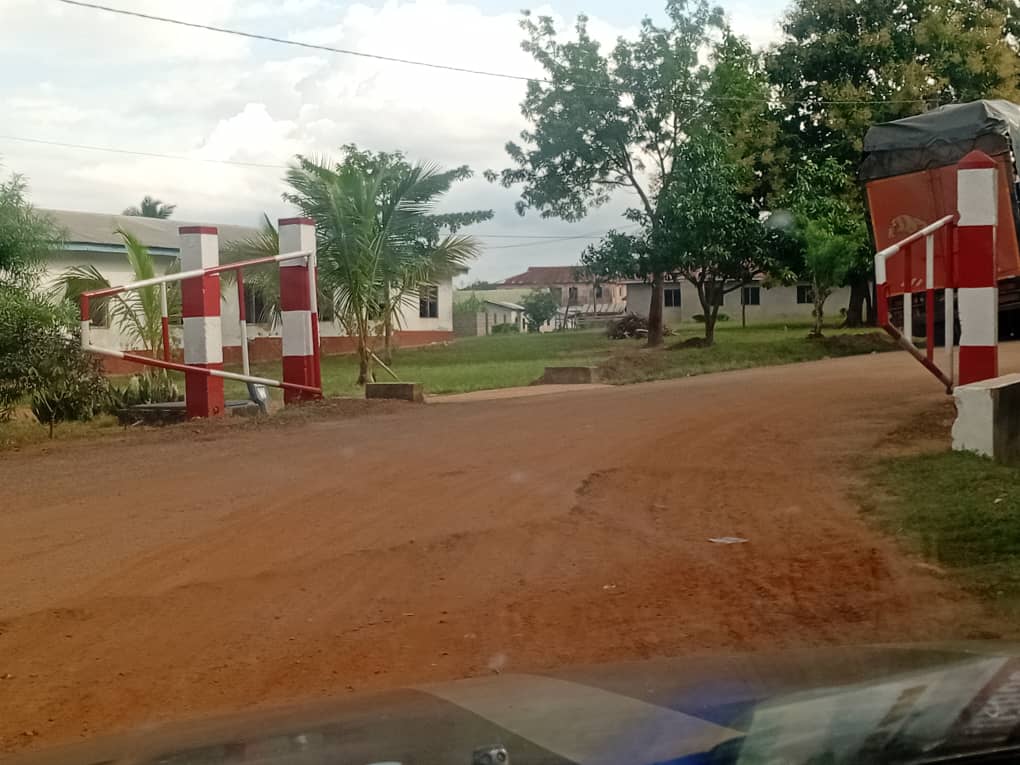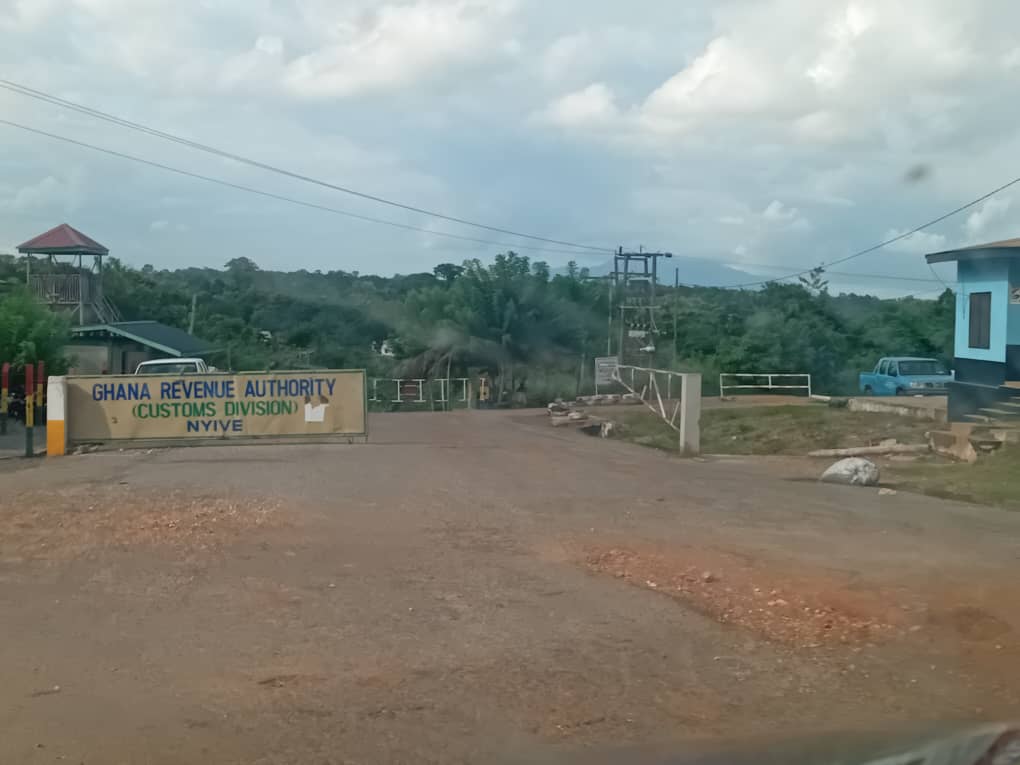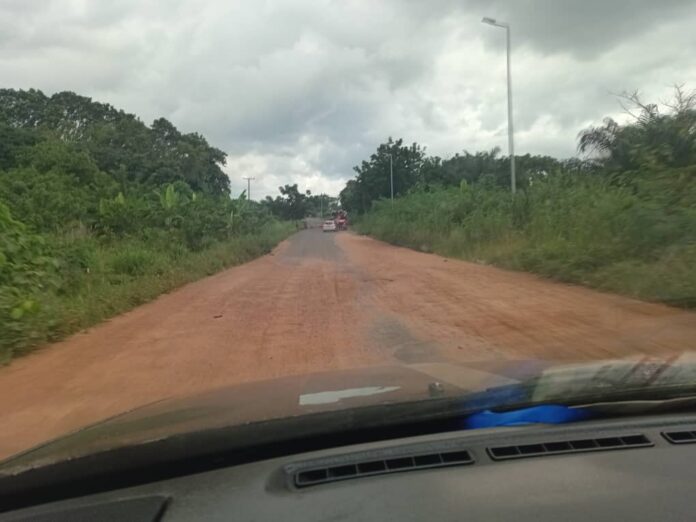In January 2024, a 25-year-old commercial motorbike rider was allegedly shot and killed by an officer of the Ghana Immigration Service at Honuta during a night patrol at Shia, a border community in the Ho Municipality of the Volta Region.
The victim was reportedly smuggling gallons of cooking oil from neighbouring Togo into Ghana.
His death sent shockwaves through the enclave, as security operatives in the area rarely resort to gunfire in efforts to thwart smuggling.
Among the many unemployed youth engaged in this perilous cross-border trade, one might have expected fear to grip the community. But it hasn’t, not in any lasting way. The trade, if anything, continues to thrive.
Kofi Mensah (not his real name) tells me smuggling goods across the Ghana-Togo border is a common trade for many in his community.
It’s around 2:00 p.m. on Sunday, 22nd June. He has just completed overhauling his motorbike in preparation for a night job, this time, smuggling cocoa beans from Ghana to Kpalimé, the district capital of Kloto in Togo.
This is not the cocoa harvesting season, but Kofi Mensah’s client has sourced and stored beans from petty farmers in the enclave. The stock is now ready for sale. From what I understand, he is likely to fetch a good price for it upon arrival in Kpalimé.
Kofi declined my request to accompany him, expressing concern that I might later expose their secret routes to the authorities.
He explained that their journeys often require navigating dense forests and crossing rivers under the cover of darkness. I watched as he meticulously packed sacks of cocoa at the seller’s residence, ready for loading onto his motorbike later that evening.
For transporting approximately 67 kilogrammes of cocoa, Kofi earns GH₵500. But the job is never one-way.
To avoid returning empty-handed, he has already secured a deal to bring back smuggled goods, two 50kg bags of sugar, rice, and cartons of cooking oil, for a local trader. That return journey will also fetch him GH₵500, bringing his weekend earnings to a total of GH₵1,000.
What I have gathered suggests that this form of cross-border enterprise, driven primarily by commercial motorcyclists, popularly known as Okada, has long been a lucrative, even if dangerous, means of survival.
However, as more riders join the trade, competition has gradually eaten into their profits.
From Kpedze, I travelled to Honuta, a neighbouring farming community. Back in the 1980s, Honuta was a major entry point into the Ho Municipality before newer border posts like Shia and Nyive were established. Today, it remains active with Okada operations.
However, the local riders were wary of talking, fearful of being exposed. A tense atmosphere briefly escalated until Kofi returned and calmed nerves.
It soon became clear that cocoa beans are the most frequently smuggled commodity from Ghana into Togo. In return, foodstuffs, motorbike parts, and vehicle spare parts make their way back into Ghana.
My next stop was Shia, a historic town also in the Ho Municipality. Much like Kpedze and Honuta, many of the youth in Shia are deeply immersed in the Okada business and, by extension, smuggling.
Though hesitant at first, some riders admitted that as passenger numbers have dwindled, smuggling now offers a more stable source of income.
Perhaps the most telling discovery in my investigation is the prevalence of unapproved routes, informal trails winding through thick bushland, often unknown to Customs or Immigration officials.
Surprisingly, I was told that Togolese security forces seldom obstruct smugglers, whether goods are heading into or out of the country.
This is not merely a tale of illegal trade. It is a chronicle of economic desperation, porous borders, and a dangerous dance between survival and the law, where a single gunshot can snuff out a young man’s life, but not the business that brought him to the border.
According to officials from the Ghana Cocoa Board (COCOBOD), the country lost an estimated 120,000 tonnes of cocoa to smuggling during the 2022–2023 season, with losses rising to 160,000 tonnes in the 2023–2024 season, amounting to more than one-third of national production.
This trade, largely driven by price differences between Ghana and neighbouring countries, has seen farmers move cocoa illegally through secretive routes using modified fuel tankers and tipper trucks.
In response, COCOBOD increased the farmgate price of cocoa by 45%, restructured its financing model, and deployed security and military personnel to guard critical border points, yet the locals know how to go about the illegal trade.
Tackling the borders
An officer at the Immigration Service who spoke on condition of anonymity due to their ranking in the service, said the higher command of the service has since strengthened border patrols and suggested alternative ways of tackling the borders since the death of the alleged smuggler.
While traveling through the enclave gathering information for this report, I saw several Immigration Officers patrolling the area on motorbikes. This confirms what I have gathered from my source.
Over the years, it has been alleged that some officials of the Ghana Revenue Authority (GRA) have themselves been complicit in smuggling operations.
In 2022, a JoyNews exposé revealed how certain customs officers facilitated the smuggling of thousands of gallons of vegetable cooking oil from Togo and Côte d’Ivoire, resulting in losses of over GH₵300 million.

Watch the full documentary below;
In response, the GRA pledged to sanction staff and officers found to be colluding with smugglers operating along the country’s borders.
The government’s efforts
Ghana’s new government says it aims to retrieve more than US$21 billion allegedly stolen by public officials from national assets as it moves to crack down on corruption.
Within six months of assuming office, President John Dramani Mahama’s government set up Operation Recover All Loot (ORAL), an independent anti-corruption agency, which, on face value, is seen as a demonstration of its seriousness.
The main target appears to be erstwhile members of former President Nana Addo Dankwa Akufo-Addo’s government, who are accused of systematically asset-stripping state institutions, tax evasion, illegal movement of goods through porous border posts, and criminal land deals, among a host of varied illicit activities.
Foreign Affairs Minister Samuel Okudzeto Ablakwa, who is past chairman of ORAL, said in February that the US$21 billion represents just 36 of the cases the agency is actively investigating.
“In total, considering the 36 cases, the high-value cases we’ve identified, and the land-related loots, we can potentially raise about $21.19 billion. This is far more than what we’ve been pursuing from the International Monetary Fund (IMF), subjecting ourselves to all sorts of conditionalities,” Ablakwa said.
He was referring to Ghana’s heavy dependence on external funding from Bretton Woods institutions and donor funding for its development projects.
Efforts to mobilise funding locally have been hampered by policy inconsistency, a weak national balance sheet, poor resourcing of state institutions, and corruption, among other factors.
ORAL is still active, investigating cases. Other state anti-corruption institutions, such as The Office of the Special Prosecutor (OSP), have also been actively fighting corruption for the past months in the country.
What are the experts saying?
Professor Evans Akwasi Gyasi, Associate Professor of International Trade at the School of Economics, Finance and Law, Anglia Ruskin University in the United Kingdom, attributes the surge in smuggling to discrepancies in tax regimes between Ghana and its neighbours.
“Why do we have a free port in Togo? How much is the duty in Togo? Because of the tax regime in Ghana, smuggling becomes an incentive,” he explained.
He added, “Nobody benefits when the tax ceiling is too high. It stifles growth and encourages people to seek alternative means of bringing goods into the country.”
Professor Gyasi urged Ghanaian policymakers to urgently reconsider the country’s port charges. “It’s time for our leaders to come together and chart a better path. Our port charges are far too high; it’s simply not sustainable.”
He highlighted the issue of corruption at border posts, noting that many traders are compelled to pay bribes to evade taxes or reduce duty obligations.
While he condemned the practice of smuggling, he emphasised the importance of prosecuting offenders and reforming the system to eliminate incentives that enable such acts.

Despite collaborative efforts from stakeholders over the years to combat the menace, smuggling remains deeply entrenched.
Attempts over the last two weeks to obtain official comments from the GRA’s Customs Division and the Ghana Immigration Service on their joint strategies for this project were unsuccessful due to time constraints.
The project received support from the Thomson Reuters Foundation through the Media Foundation for West Africa (MFWA) as part of its global work aimed at strengthening free, fair, and informed societies. Any financial assistance or support provided to the journalist has no editorial influence. The content of this article belongs solely to the author and is not endorsed by or associated with the Thomson Reuters Foundation, Thomson Reuters, Reuters, or any other affiliates.
DISCLAIMER: The Views, Comments, Opinions, Contributions and Statements made by Readers and Contributors on this platform do not necessarily represent the views or policy of Multimedia Group Limited.
DISCLAIMER: The Views, Comments, Opinions, Contributions and Statements made by Readers and Contributors on this platform do not necessarily represent the views or policy of Multimedia Group Limited.


